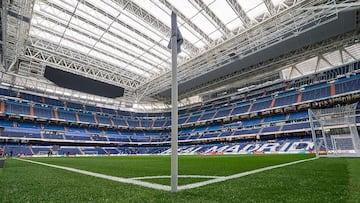2030 FIFA WORLD CUP
Why could Spain be stripped of the right to host the 2030 FIFA World Cup?
The 2030 tournament is due to be played in Spain, Portugal and Morocco but could an investigation into the RFEF change FIFA’s plans?

The Royal Spanish Football Federation (RFEF) continue to be investigated by the Spanish Civil guard for alleged corruption and money laundering related to “irregular contracts” signed over the last five years. And the latest scandal to rock the Federation could cost Spain the right to host the 2030 World Cup, which it is scheduled to do with Portugal and Morocco.
“Minimal risk” of Spain losing the 2030 World Cup
FIFA has already - unofficially - expressed its concern regarding the situation and Nicolás de la Plata, Doctor in Sports Law and a Professor of Sports Law and Sports Policy, says there is a chance, albeit a minimal one, Spain could be stripped of the tournament.
“FIFA is a private and prestigious entity, and Gianni Infantino’s reform has greatly improved its transparency and governance,” de la Plata explains. “And it is a private entity, so it can do whatever it sees fit. So, of course, the risk of Spain losing the World Cup exists, even if it is minimal. And it exists basically because the FIFA Congress must ratify Spain as one of the organisers, as determined by article 69 of FIFA’s statutes”.
How could the RFEF corruption scandal actually strengthen Spain’s position?
However, de la Plata believes the investigation into the RFEF shows Spain, as a country, doesn’t tolerate corruption, which should in fact strengthen its position.
“In my opinion, FIFA would be wrong to take the World Cup away from Spain. The most important thing, six years before the tournament, is that we are one the best nations in the world when it comes to organising tournaments like this, according to all the reports. And what we’re seeing is the rule of law being applied in Spain. FIFA has much faster response times, because it acts in accordance with private regulations. Spain’s regulations are public ones and, although the process is taking longer, it is also taking action. That is precisely what proves to FIFA that our candidacy is strong.”
Alleged crimes “committed by people, not the organisation”
“Additionally, the important thing in this case is the authorities are not taking action against the RFEF Federation a whole, the (alleged) crime hasn’t been committed by the organisation but by people within the organisation. The RFEF does not commit crimes, it is harmed by possible crimes.
“It is different, for example, from what has happened with Fútbol Club Barcelona, because in this case potential damage to the organisation itself is what’s being investigated.”
If bad news does eventually come, de la Plata doesn’t believe it will especially soon, which should also work in Spain’s favour. “It would be strange if FIFA made a decision in a week or in a month. The RFEF has a serious problem right now, that is obvious. But maybe this will help change things for the better and the organisation can come out of it stronger. As they say, perhaps every cloud has a silver lining. The government and the future leaders of the Federation have to cleanse the organisation and introduce more prevention measures so that there are no new crimes. Spain has to make it known to FIFA that it wants to solve the problem.”





